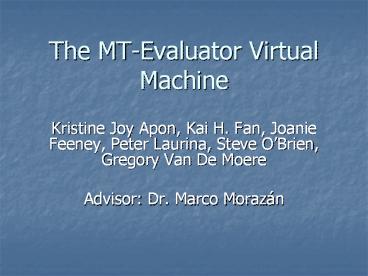The MTEvaluator Virtual Machine - PowerPoint PPT Presentation
1 / 12
Title:
The MTEvaluator Virtual Machine
Description:
The MT-Evaluator Virtual Machine ... MT Compiler for different functional languages. Design and implementation of a GC algorithm that exploits the MT ... – PowerPoint PPT presentation
Number of Views:50
Avg rating:3.0/5.0
Title: The MTEvaluator Virtual Machine
1
The MT-Evaluator Virtual Machine
- Kristine Joy Apon, Kai H. Fan, Joanie Feeney,
Peter Laurina, Steve OBrien, Gregory Van De
Moere - Advisor Dr. Marco Morazán
2
Functional Programming
- Describing processes such as mathematical
notations and procedures - (define (fact n)
- (if ( n 0)
- 1
- ( n (fact (- n 1))) ) )
3
Functional Programming
- Benefits
- More intuitive than imperative languages such as
C and Java - Easy to prove correctness of functions
- Truly machine independent
- Fast prototyping
4
Disadvantages
- Poor virtual memory interaction can make them
slow. - Excessive paging can profoundly affect
performance.
5
Distributed Virtual Memory System
- Tailored for functional languages implemented
completely in software. - Parallelize the engine that evaluates programs
and not individual user code. - Parallelize memory management.
6
MT Architecture
7
Virtual Machines
- Software that emulates a real machine by keeping
track of state. - Can port software from one machine to another.
- Can execute software designed for a machine never
physically implemented. - The MT evaluator is a switch-based virtual
machine.
8
MT Evaluator Virtual Machine
9
Implementation
- Heap, stack, symbol table, and code are objects
implemented in C - Instance variables
- For data
- For virtual memory implementation
- Public and private methods
- Public methods constructor, data access methods.
- Private Methods memory management routines.
- Paging occurs within these discretized memory
spaces. - No shared memory (either pages or frames) between
spaces.
10
Paging Policy Considerations
- Paging behavior of distributed spaces
- Heap
- FIFO LRU (FIFO has less overhead).
- Stack
- LRU superior to FIFO.
- Uses a special version of LRU without timestamps.
- Code
- DLL-LRU LRU employing a circular double-linked
list.
11
Test 1 Creating a list of 10000 random numbers
using FIFO
- Empirical Measurements for performance
- Heap
- 40000 accesses
- 20000 allocations
- 60 faults (.0015 fault rate)
- Stack
- 270013 accesses
- 120006 allocations
- 99 faults (.0004 fault rate)
12
Future Work
- Comparing FIFO LRU, other paging algorithms for
code space and garbage collection. - Implementation of 1st-class functions.
- Development of an MT Compiler for different
functional languages. - Design and implementation of a GC algorithm that
exploits the MT architecture.

